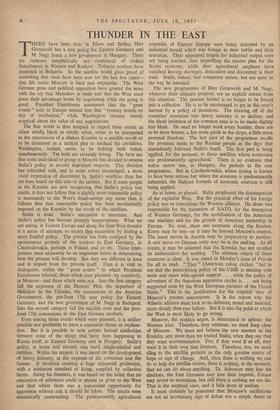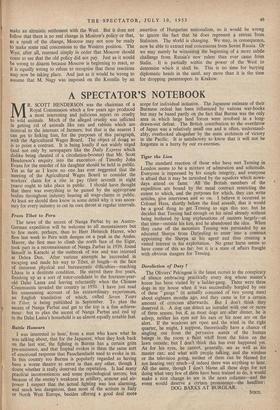THUNDER IN THE EAST
THERE have been riots in Pilsen and Berlin; Herr Grotewohl has a new policy for Eastern Germany and M. Nagy heads a new government in Hungary. There are rumours (emphatically not confirmed) of violent disturbances in Warsaw and Krakow. Tobacco workers have protested in Bulgaria. So the satellite world gives proof of something that must have been true for the last five years— that life under Moscow is hard and unpopular. The West German press and political opposition have greeted the news with the cry that Malenkov is weak and that the West must press their advantage home by negotiating while the going is good. President Eisenhower announces that the " great events " astir in Europe remind him that " tyranny breeds its day of retribution," while Washington remains sternly sceptical about the value of any negotiations.
The free world is thus tempted to regard these events as either wholly black or wholly white, either to be interpreted as the concessions of a shaken Kremlin to a satellite revolt or to be dismissed as a tactical plot to mislead the credulous. Washington, indeed, seems to be holding both beliefs simultaneously. Yet both are certainly wrong. The facts are that some individual or group in Moscow has decided to reverse Stalin's policy in several important respects. This decision has coincided with, and to some extent encouraged, a more vocal expression of discontent by Stalin's satellites than has yet been heard on this side of the curtain. But if some people in the Kremlin are now recognising that Stalin's policy was sterile, it does not follow that a slightly more reasonable policy is necessarily to. the West's disadvantage any more than it follows that that reasonable policy has been involuntarily imposed on the Kremlin by the revolt of the satellites.
Stalin is dead. Stalin's succession is uncertain. And Stalin's policy has become patently inappropriate. What we are seeing, in Eastern Europe and along the East-West frontier is a series of attempts to secure that succession by finding a more .fruitful policy. The process has been confused by the spontaneous protests of the workers in East Germany, in Czechoslovakia, perhaps in Poland, and so on Those inter- jections must ultimately be an important factor in determining how the process will develop. But they are different in kind and in import from the process itself. Thus it is vital to distinguish, within the " great events " to which President Eisenhower referred, those which were planned—by somebody, in Moscow—and those which were not. Into the first category fall the exposure of the Doctors' Plot, the departure of Melnikov in the Ukraine, the concessions to the Austrian Government, the pre-June 17th new policy for Eastern Germany, and the new government of M. Nagy in Budapest. Into the second category fall the satellite riots and the post- June 17th concessions to the East German workers.
Even among those events which were planned, it is neither possible nor profitable to trace a consistent theme or explana- tion. But it is possible to note certain factual similarities between some of the things that have been happening in Russia itself, in Eastern Germany and in Hungary. Stalin's policy, at home and abroad, was hard, single-minded and ruthless. Within his empire, it was based on the development of heavy industry, at the expense of the consumer and the fanner. It involved creating a huge industrial proletariat, with a minimum standard of living, supplied by collective farms. Along his frontiers, it was based on the belief that no concession of substance could or should be given to the West and that where there was a convenient opportunity for aggression without risk it should be taken. The results were dramatically unrewarding. The predominantly agricultural countries of Eastern Europe were being distorted by an industrial mould which was foreign to their habits and their resources. Their appointed targets for industrial output were not being reached, thus imperilling the master plan for the Soviet economy, while their agricultural surpluses have vanished leaving shortages, dislocation and discontent in their train. Stalin, indeed, had conquered nature, but not quite in the way he intended.
The new programmes of Herr Grotewohl and M. Nagy, whatever their ultimate purpose, are an explicit retreat from this situation. The peasant farmer is no longer to be forced into a collective. He is to be encouraged to get in this year's harvest by a policy of incentives. The drawing off of the countries' resources into heavy industry is to decline; and the bleak existence of the common man is to be made slightly less bleak. He need no longer work every Sunday; there are to be more houses, a few more goods in the shops, a little more personal freedom. The last part of the programme recalls the promises made to the Russian people in the days that immediately followed Stalin's death. The first part is being ' applied, for the moment, to those satellites whose economies are predominantly agricultural. There is no evidence that active unrest was, in Hungary, the prelude to the new programme. But in Czechoslovakia, where rioting is known to have been serious but where the economy is predominantly industrial, the Stalinist formula of economic coercion is still being applied.
As at home, so abroad. Stalin prophesied the disintegration of the capitalist West. But the practical effect of his foreign policy was to consolidate the Western alliance. He alone was responsible for the formation of NATO, for the resurgence of Western Germany, for the mobilisation of the American war machine and for the growth of American leadership in Europe. So, now, there are overtures along the frontier. Korea may be one—or it may be beyond Moscow's control.
The latest moves in Austria may be preparatory to another.
A new move on German unity may be in the making. At all events, it may be assumed that the Kremlin has not recalled its ambassadors for nothing. The ultimate object of these overtures is clear. It was stated in Monday's issue of Pravda for all to read. " They " (American ruling circles) " fail to see that the peace-loving policy of the USSR is meeting with more and more wide-spread support . . . while the policy of adventure of the American aggressive circles is . . . not being supported even by the West European partners of the United States." This is the justification for the sceptics' view of Moscow's present manoeuvres. It is the reason why the Atlantic alliance must look to its defences, moral and material, more closely than ever before. But it is also thp point at which the West is most likely to go wrong.
Moscow, the sceptics argue, is determined to splinter the Western bloc. Therefore, they continue, we must keep clear of Moscow. We must not believe the new masters in the Kremlin, any more than we trusted Stalin, when they say that they want accommodation. For, if they want it at all, they want it in their own hest interests. Therefore, too, we must cling to the satellite protests as the only genuine source of hope or sign of change. And, since there is nothing we can do to help the satellite rioters, there is nothing, at the moment, that we can do about anything. Dr. Adenauer may lose his elections, the East Germans may lose their impetus, France may revert to neutralism, but still there is nothing we can do. That is the sceptical view, and it falls short of realism.
It must certainly be presumed that Moscow's vacillations are not an involuntary sign of defeat nor a simple desire to make an altruistic settlement with the West. But it does not follow that.there is no real change in Moscow's policy or that, as a result of the change, Moscow may not now be ready to make some real concessions to the Western position. The West, after all, rearmed simply in order that Moscow should come to see that the old policy did not pay. Just as it would be wrong to disarm because Moscow is beginning to react, so it is equally wrong to refuse to recognise that those reactions may now be taking place. And just as it would be wrong to assume that M. Nagy was imposed on the Kremlin by an .assertion of Hungarian nationalism, so it would be wrong to ignore the fact that he does represent a retreat from Stalinism. The World is changing. We may, in consequence, now be able to extract real concessions from Soviet Russia. Or we may merely be witnessing the beginning of a more subtle challenge from Russia's new rulers than ever came from Stalin. It is partially within the power of the West to determine which it shall be. This is no time for burying diplomatic heads in the sand, any more than it is the time for dropping paratroopers in Krakow.



































 Previous page
Previous page